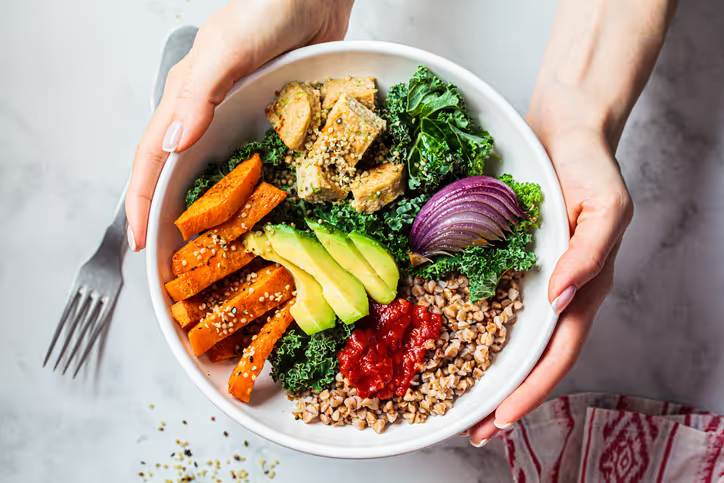Many people achieve short term weight loss through drastic measures such as fasting or cutting out certain foods which can lead to feelings of deprivation and discouragement. The weight may come off at first, but when old habits return, so does the weight. Here are 14 healthy eating habits to lose weight that can help improve your nutrition without giving up your favorite foods, enhance your health, protect your mental well-being, and keep the weight off for good!
14 healthy eating habits to lose weight
1. Avoid drinking your calories
Popular beverages like juice, soda, alcoholic drinks, and some coffee drinks can be loaded with calories from added sugars. Chewing food takes time, but swigging back a high-calorie or alcoholic drink is easy, and before you know it, you're asking for a refill. Because of that, high-calorie beverages can hamper your weight loss progress. Ultra-processed beverages such as soda are also more likely to cause inflammation and lead to chronic disease. Swapping a soda for a diet version is a solution some use to lose weight. However, diet sodas and other zero-calorie drinks are sometimes sweetened with an artificial sweetener called sucralose, also known as Splenda(R). Opting for a diet beverage can be alright in moderation, but it is best to avoid drinking them frequently. A 2016 animal study published in Cell Metabolism found that regular sucralose intake led to a higher motivation to eat and more calories consumed. It's best not to rely on sucralose-sweetened drinks as a go-to weight loss solution. Instead, drink water most of the time, which will keep your body well hydrated. You can keep it interesting by adding berries or citrus slices to infuse water or herbs like mint or basil.
2. Pre-load your meals with salads
Eating a salad before your entree has many benefits. First, a salad is an opportunity to get some vegetable servings into your day. Vegetables are a cornerstone of a healthy diet because they're high in fiber, vitamins, minerals, and antioxidants, and low in calories, fat, and carbohydrates. Another benefit of a pre-meal salad is that fiber can help you feel full faster and could curb how much you eat when it's time for your meal. In turn, you may consume fewer calories, which over time could decrease your weight. A 2019 study published in the Journal of the Academy of Nutrition and Dietetics found that salad eaters had significantly higher intakes of vitamins A, K, B6, C, E, folate, and others. Enjoying a salad before your meal naturally increases your intake of plant-based foods to boost your health.
3. Practice mindful eating
It's not uncommon to eat while you also scroll your newsfeed or get some work done. Mindful eating helps you focus on your meal, free of distractions, so that you can focus on enjoying your meal⸺the taste, smell, texture, and visual appeal. That way, you're more in tune with your body while attentive to your chewing, swallowing, hunger, and fullness cues. Research shows that your environment can influence how much or how little you eat, so mindful eating lets your body take back control and allows you to be thoughtful about when you're done eating.
4. Avoid eating late
Whether it's salty chips or a bowl of ice cream, late-night snacks may interfere with your weight loss goals. Research shows the timing of your meals matters. A 2021 study published in the British Journal of Nutrition assessed meal timing and weight loss in 82 women. The women were split into two groups: an earlier evening meal (EEM) and a later evening meal (LEM). After 12 weeks, the EEM group experienced more weight loss than the LEM group. According to the study, late-night eating can disrupt sleep patterns, which may also influence appetite. Eating fiber and protein-rich meals during the day can help lessen the desire to eat late in the evenings.
5. Choose whole grains most of the time
The recommended advice included in the Dietary Guidelines for Americans 2020-2025 is to make half of your daily grain intake whole grains. Whole grain seeds or kernels have three nutritious parts – bran, germ, and endosperm. Whole grains are rich in B vitamins, protein, fiber, healthy fats, minerals, and complex carbohydrates. Pasta, white bread, and crackers are examples of refined grains. The bran and germ are lost through the processing of refined grains, making them less nutritious foods. Whole grains are a better option because they're more likely to fill you up with their fiber-rich contents, which can help with weight loss.
6. Keep your meals balanced
Eating meals that offer balance, variety, and color can significantly impact weight loss. The key is to eat multiple food groups at once. If you've ever eaten a muffin for breakfast, you may have noticed a surge of energy followed by a crash. After an hour or less, your hunger pangs begin, and you're ready to eat again. Eating just a muffin is not offering your body enough nutrition to support sustained energy and spur weight loss. Depending on the size of the muffin, you may consider cutting it in half and adding hard boiled eggs and fresh raspberries to your breakfast. You're adding protein to create a healthy meal that will keep you full for longer, help balance your blood sugars, and promote weight loss. Adding fruit like fresh raspberries gives you fiber and loads of vitamins and minerals essential to your body. A good rule of thumb for balancing meals is to fill half your plate with non-starchy vegetables, one-quarter with fruit, and the remaining one-quarter with lean protein.
7. Don't overly restrict yourself
Science shows restrictive eating habits are ineffective for weight loss, and restrictive eaters in this study published in Brain Imaging and Behavior were prone to choose high-calorie foods. Following fad diets or diet plans that are strict about your eating habits can cause out-of-control eating behaviors and affect your mental health. Restrictive eating can be dangerous and mirror eating disorder behaviors. This counterproductive strategy isn't necessary, and there are better ways to accomplish your goals. Be kind to yourself and choose healthy ways to change your eating habits to lose weight.
8. Mind your portion sizes
Consistently eating large portions can provide more calories than you need, leading to weight gain over time. Practicing portion control is more important than ever because restaurant portions have become progressively larger. If you are tempted to finish these portions, try to listen to your body's satiety cues and ask for a to-go box to enjoy the rest of your meal for lunch or dinner the next day. To avoid eating more than you need at one time, try eating smaller portions to lose and maintain a healthy weight, paying attention to your body's hunger and fullness cues to adjust as needed.
9. Embrace your inner chef
Restaurants and fast food joints are infamous for producing foods that offer more calories in a meal than you need in an entire day. The solution? Cooking more at home. Consider the things you like to eat out and try to whip up a healthier version at home. The best part about cooking at home is that you're in control of what you make, how you cook the food, and what ingredients you add. While it's still possible to eat out and still lose weight, cooking at home more often puts you in a better position to master your health goals.
10. Try meal prepping
Meal prep is a great way to give yourself the gift of healthy home cooked meals. When you think of meal prep, you might imagine a row of perfectly portioned meal containers ready to go in the fridge. But, there are multiple types of meal prepping, and it's best to pick one that suits your lifestyle. Some people prep meals ahead of time that they can grab and take to work, and others may meal prep by making slow cooker freezer meals. Meal prep can be as easy as prepping ingredients ahead of time, like chopping up vegetables so they're ready for a Friday night stir-fry or boiling eggs for breakfast the next morning. Whatever it may be, make meal prepping work for you to ensure that you have healthy meals to eat throughout the week. Meal prepping can also help in controlling food portion sizes, making the amount you eat at each meal more consistent.
11. Introduce healthy fats to your diet
Fats have gained a healthier reputation in recent years. Still, it's essential to watch your saturated fat intake for overall health and choose healthy fat sources more often. Healthy fats, or unsaturated fats, may help with weight loss by increasing satiety which suppresses your appetite. Healthy fats for weight loss include avocados, nuts, nut butter, full-fat yogurt, and salmon. You can eat mashed avocados in a dip with fresh veggies or enjoy full-fat yogurt with cinnamon and sliced bananas for dessert. It is important to note that too much fat, especially saturated fats, can hinder weight loss efforts and even lead to medical conditions such as high blood pressure or increased cholesterol levels.
12. Keep healthy food accessible
Opening a bag of snacks takes less effort than peeling an orange. It sounds trivial, but access can make a difference in a person's food choice. Make eating nutritious foods a simple decision by pre-cutting fruit and vegetables and placing them in view. You can leave fruits like apples and bananas in a fruit bowl on the counter and put pre-cut produce in a clear container, that way, you see them each time you open your fridge. Consider keeping nuts, dried fruit, and seeds in see-through canisters so they're easily accessible for a nutrient-rich snack. By doing so you will be able to better incorporate a variety of foods and food groups into your daily diet.
13. Carry healthy snacks with you
Packing healthy snacks on the go is a way to set yourself up for weight loss success, plus it helps you avoid swinging through the drive-thru on an empty stomach. A lunch bag with an ice pack helps to keep healthy snacks like cheese sticks, yogurt, and hummus cold. Non-perishables are great to take along with you or stow away in your car. – Nuts, seeds, rice cakes, bison jerky, peanut butter packs, and protein bars are some ideas.
14. Start your day with plants
According to the Centers for Disease Control, only 9% of Americans are eating enough vegetables and 12% eat enough fruit. Research tells us that plant-based and vegetarian diets are linked with lower body weights, and these diets are plentiful in fruits, vegetables, legumes, nuts, seeds, and whole grains. Your average American breakfast contains fatty meats like sausages and bacon, calorie-laden gravies, and sugary foods like muffins, syrups, donuts, and croissants. While fruit is a standard breakfast item, other plant foods like vegetables, nuts, seeds, and beans are typically eaten later in the day. You can increase your intake of plant foods and reap their countless benefits by enjoying them at your morning meal. Consider adding leafy greens or other veggies to scrambled eggs, topping a yogurt parfait with sliced almonds or sunflower seeds, or adding a side of black beans or diced sweet potatoes to a breakfast wrap.
How Form Health can help you reach your weight loss goals
Remember, developing healthy eating habits can not only help you lose weight, but can also help your overall wellbeing by increasing your energy levels, improving your mood, balancing your hormones, reducing heartburn, and so much more. Healthy, sustainable weight loss comes from making small, realistic changes to your lifestyle. Even minor changes can make a big difference in achieving your weight loss and health goals.
At Form Health, your Care Team will work with you on improving behavioral health, nutrition, physical activity, and prescribe medication when deemed appropriate.




